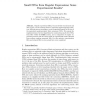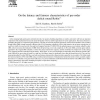64 search results - page 1 / 13 » Reducing the Size of NFAs by Using Equivalences and Preorder... |
CPM
2005
Springer
13 years 10 months ago
2005
Springer
Abstract. The efficiency of regular expression matching algorithms depends very much on the size of the nondeterministic finite automata (NFA) obtained from regular expressions. R...
ACMSE
2006
ACM
13 years 10 months ago
2006
ACM
Classic results in the theory of regular languages show that the problem of converting an NFA (nondeterministic finite automaton) into a minimal equivalent NFA is NP-hard, even f...
CORR
2010
Springer
13 years 4 months ago
2010
Springer
Regular expressions (REs), because of their succinctness and clear syntax, are the common choice to represent regular languages. However, efficient pattern matching or word recogni...
JALC
2007
13 years 4 months ago
2007
Merging states in finite automata is a main method of reducing the size of the representation of regular languages. The process has been extensively studied for deterministic fi...
COMCOM
2004
13 years 4 months ago
2004
In the emerging high-speed packet-switched networks, fair packet scheduling algorithms in switches and routers will form an important component of the mechanisms that seek to sati...


